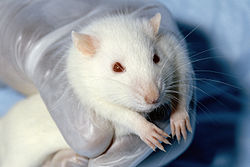History
Animal Free Research UK was established as the Dr Hadwen Trust for Humane Research in 1970 (registered charity number 261096). [3] [4] It was formed by the British Union for the Abolition of Vivisection (BUAV) in honour of its former president, Walter Hadwen. In 1980, Dr Hadwen Trust split from BUAV and became an independent charity. [3]
The charity became incorporated as a charitable company (registered charity number 1146896) in 2013. In 2015, the Dr Hadwen Trust became registered as a charity in Scotland (SC045327). In April 2017, the charity changed its working name from Dr Hadwen Trust to become Animal Free Research UK. [3]
Animal Free Research UK promotes the practice of non-animal research through its funding, publications, science community outreach, and the media. Its purpose is to "support scientists to transition from using animals to using new approach methodologies in medical research". [5]
Research
Projects receiving funding from the Dr. Hadwen Trust range from epilepsy, multiple sclerosis, [6] breast [7] and skin cancer, meningitis, asthma, diabetes and drug testing, to arthritis, Parkinson’s disease, lung injury, whooping cough, vaccine testing, dentistry, heart disease, tropical illness, fetal development, brain tumours, and AIDS.
Funding is received in the form of summer studentships, PhD students, post-docs, and strategic grants.
This page is based on this
Wikipedia article Text is available under the
CC BY-SA 4.0 license; additional terms may apply.
Images, videos and audio are available under their respective licenses.


